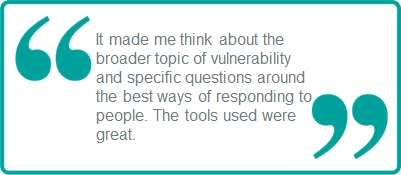UK Deaf Awareness Week 2023
- 04 May 2023

It’s deaf awareness week this week and this year’s theme is ‘deaf inclusion’. Action on Hearing Loss estimates that more than 12 million UK adults have some degree of hearing impairment or deafness.
I’ve watched and read several interesting discussions this week explaining how hearing loss can lead to withdrawal and isolation as there’s often an embarrassment factor and stigma attached to hearing loss and a real reluctance in many to use hearing aids when the need arises. When we think of hearing aids, the stereotypical image we draw in our mind’s eye is of the large hearing aids our grandparents wore, which whistled or buzzed, and they’d eventually switch off and fall silent, becoming detached from the conversation. However, there’s been a huge development in recent years over the size of hearing aids and the improvements they can bring to your hearing if you are experiencing hearing loss. There’s no need to feel isolated or excluded any longer.
One of the most common types of hearing loss is known as high-frequency hearing loss. This means high-pitched sounds are harder to hear. It can affect anyone of any age, but it's more common in older adults with age-related hearing loss, as well as people exposed to loud noises.
According to Healthy Hearing some of the symptoms of high-frequency hearing loss are that you may struggle to hear certain consonants (e.g., ‘s’, ‘h’ or ‘f’) which are typically spoken at a higher frequency and as a result speech can sound muffled especially when using the telephone, watching television or in noisy environments like cafes and restaurants. With this condition, you may also find it harder to hear or understand women's and children’s voices as they are typically higher pitched.
STOP SHOUTING!!
During our training sessions on Recognising Vulnerability and Making Reasonable Adjustments one of the most common questions we address is “how can customer service staff in contact centres and face-to-face help customers with hearing loss?” Teams often tell us that they resort to shouting to help the customer to hear more.
I had a particularly memorable experience visiting a client’s contact centre where one advisor was on the phone with a hard of hearing customer. The customer kept telling the advisor that they couldn’t quite hear what they were saying and so the advisor, a softly spoken woman, tried to increase the volume of her voice again and again, until she was quite literally shouting down the phone. It brought the whole contact centre to a standstill as other advisors couldn’t hear themselves or the customers they were dealing with, and yet the customer still couldn’t hear and because he was being shouted at thought he was in trouble! There must surely be a better way…
Info cards
The good news is there are several reasonable adjustments to choose from that will help customers who are experiencing hearing loss to be able to engage with support and service teams, be that face-to-face or remotely through a contact centre. We CAN be much more inclusive when serving customers with hearing loss and are able to offer the customer a choice that works best for them, which customers feedback very positively on. For example, the simplest solution of moving from a noisy contact centre to a quiet meeting room or corner with less background noise and speaking slower will also help. When we speak more slowly the pitch of our voices is lowered, and so the customer may be able to hear more. It may be more appropriate to change contact channel from the telephone to using live chat or a video conferencing service to enable lip reading or the customer to wear headphones which can aid hearing through the reduction of background noise. Alternatively, a BSL interpreter could be looped into the video meeting if the use of sign language would be more helpful. 
Here at ReynoldsBusbyLee, we’ve researched and collated helpful tips for approximately 20 different circumstances which can cause vulnerabilities (including handling contacts with customers with hearing loss) into a handy resource called Info Cards, which we share in our training courses. Our pack covers common conditions such as Alzheimer’s, Schizophrenia, ADHD, and Dyspraxia. Each Info Card explains what the condition is and how it affects members of the community, outlining how the characteristics of the condition may affect interactions and then offering a range of reasonable adjustments that could be put into place and where advisors can signpost customers to further support should that be helpful.
Our clients love this resource and use them in role play, training, and coaching sessions as well as case study review sessions to provide a reliable guide for the advisor to work through. They’re also often added to intranet support sites to give advisors access to guidance when handling a contact.
We’ve completed our 2023 update and refresh of our Info Cards and have some sample packs to give away. If you’d like to receive a free sample pack, please email us at
If you’d like any further information about our training courses you’ll find more information here where you’ll also find our free downloadable course outline.
Elaine Lee
Photo: Sharon Waldron @Unsplash




